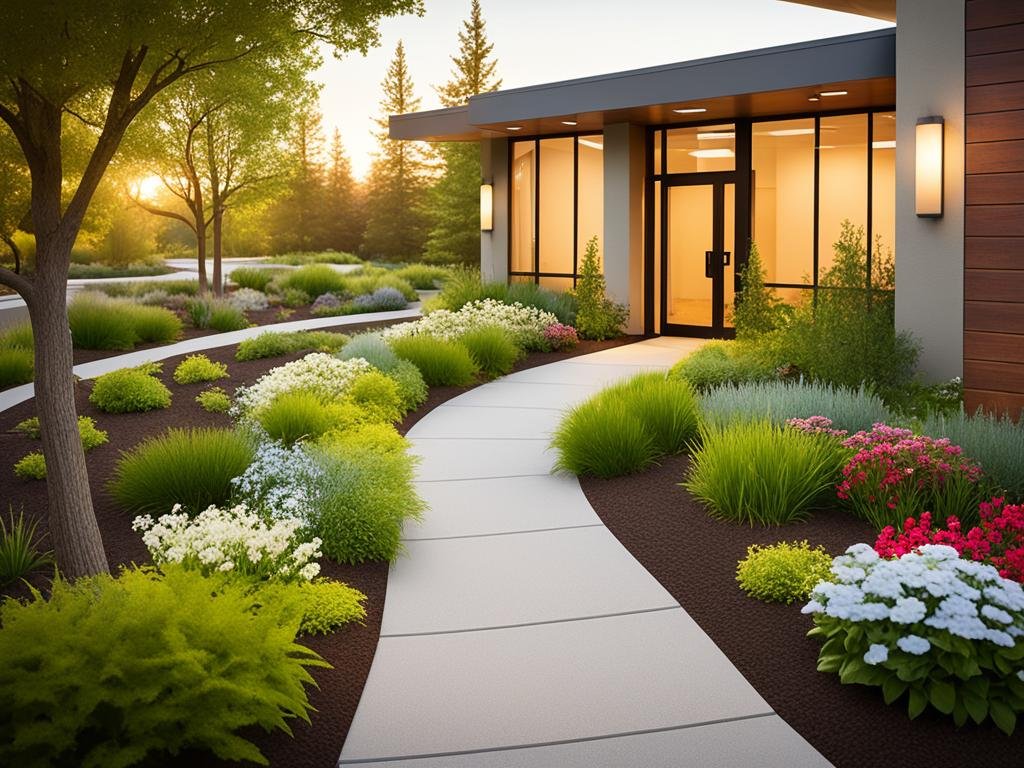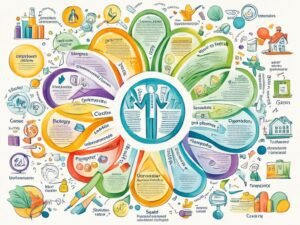Taking steps to treat depression is bold and shows hope. Timberline Knolls Residential Treatment Center is here for you. We offer personalised care for a healthier life. In treatment, you’ll learn how to control thoughts and actions. You’ll find out about depression and learn new ways to handle stress.
Depression treatment fights the feeling of being alone. At Timberline Knolls, you discover you’re never alone. You’ll find the support you need for your recovery.
Key Takeaways
- Depression treatment facilities offer individualized care to help you regain control and live a healthier life.
- Residential and inpatient depression programs provide 24/7 support and a therapeutic environment for severe depression.
- Holistic depression therapy, wellness retreats, and intensive depression treatment programs are available to address your unique needs.
- By seeking treatment, you’ll learn to manage depression and overcome the sense of isolation it can cause.
- Timberline Knolls Residential Treatment Center is ready to provide the compassionate, evidence-based care you deserve.
What Is a Depression Treatment Facility?
Depression treatment centers help people with depression and other mental health issues. They offer care all day and night. It’s important to research to find the right place for you.
Understanding Inpatient and Outpatient Care
Some centers have inpatient care. This means you stay there. Others offer outpatient care, where you go home. Inpatient care is for those who need help all the time. Outpatient care is for those who can do well at home.
The Admissions Process
When you start at a treatment center, you get a full check-up. A team checks you to make a plan just for you. This plan includes medicine and different therapies to help you.
Personalized Treatment Plans
Treatment plans at these centers are made just for you. People like doctors and nurses work with you. They use the best proven methods and listen to your ideas too.
Therapies for Treating Depression
Many therapies can help women and girls facing depression. These include different kinds of depression treatment. You will get a plan designed just for you. It will have activities and ways to feel better.
Cognitive Behavioral Therapy (CBT)
Cognitive Behavioral Therapy (CBT) is great for fighting depression. It works by changing bad thoughts into good ones. This helps you improve your mood and life. You learn how thoughts, feelings, and actions are connected.
Dialectical Behavior Therapy (DBT)
Dialectical Behavior Therapy (DBT) is also very effective. It shows you how to control your emotions and get along with others. You improve in four main areas. Which are being aware, handling feelings, putting up with hard times, and being good in relationships.
Mindfulness-Based Cognitive Therapy (MBCT)
Mindfulness-Based Cognitive Therapy (MBCT) blends CBT with focusing on now. It helps you understand your thoughts and emotions better. This way, you don’t get stuck in harmful thoughts that bring you down. You learn to face problems with an open heart and mind.
Your plan might also include other methods like ACT or talking with a counselor. These might be in one-on-one or group meetings. There are also fun activities like drawing, yoga, and dancing.
Benefits of Residential Treatment for Depression
Inpatient facilities are great for those with depression. They offer a safe place to start or keep going with recovery. People stay there for their whole treatment, getting help 24 hours a day from a team of experts.
Being away from home or work lessens daily worries. It lets folks concentrate more on getting better. This is a big plus of going to a place like this.
Comprehensive Programming
When you first go to the center, you get lots of check-ups and tests. The medical team shares the results with other doctors and your family or friends. They make a special plan just for you.
After treatment, there’s a program to keep helping you. This makes sure you still have support after you leave.
Round-the-Clock Support
The best part about these places is help is always there. You can work on getting better without the usual life pressures. This support and the personal care help in every way possible.
Choosing the Right Depression Treatment Facility
There is no one perfect type of treatment for depression. Each person is different. They deal with depression in their own way. So, finding the depression treatment center that fits your needs is key .
Individualized Treatment Approach
Timberline Knolls Residential Treatment Center offers depression treatment for adult women and adolescent girls. We also help adult women at the partial hospitalization level. Every woman and girl gets a special individualized plan based on what they need.
Treatment Environment and Amenities
Our depression treatment center focuses on adult women and girls. Everything is set to help females the best. You’ll get a plan for when you leave to keep getting better. Plus, you can join our alumnae program for support and activities.
Continuing Care and Alumni Support
After depression treatment, you get a clear plan to help you keep doing well. You can also join our alumnae program for activities and support.
depression treatment facilities
Inpatient facilities offer a safe place for people with depression to start or keep getting better. People live at the facility while getting help. They have support around the clock from mental health pros.
Types of Depression Treatment Facilities
Outpatient therapy is not as intense, and you don’t stay at the facility. This is good for people who can handle their symptoms at home. Inpatient therapy is more involved. It suits those dealing with severe distress or challenges. Outpatient is for times of high stress or need for short-term extra help.
Accreditation and Licensing
Admission to a depression treatment center starts with a process. The center’s resources decide its cost. Most insurance plans help with costs of staying in these places.
Dual Diagnosis: Depression and Substance Abuse
A dual diagnosis means someone has a mental health issue along with a substance problem. Depression and addiction often happen together. People with both face worsened symptoms and a higher risk of bad outcomes. In the US, over 9 million adults deal with this. Half of them with mental health problems also have substance issues. A mix of therapy and medicines can help with depression. You can get better and live without depression signs.
Getting help for dual diagnosis is important for getting better. At Fort Behavioral Health, they offer plans based on complete check-ups. They have special addiction programs for those with dual diagnosis. Their program includes detox, therapy, and other helpful services.
| Criteria for Dual Diagnosis Treatment | Benefits of Dual Diagnosis Treatment |
|---|---|
|
|
Dual diagnosis treatment programs work well for those battling addiction and mental health problems. They help by treating both issues at once. This lets people make long-term progress and feel better overall.
Treating Chronic and Persistent Depression
Treatment can make depression symptoms lessen to below diagnosis level. Chronic depression lasts over 2 years with severe symptoms. It can come back and go away again during your life. But, getting help makes dealing with it easier and faster.
Relapse Prevention Strategies
Depression can come back even after treatment. Seeking help from chronic depression treatment can work. It helps to find and treat the causes of depression. This stops it from coming back.
Most persistent depression rehab programs help with planning to keep depression away. They offer aftercare and support from others. If depression returns, it just shows you need more help. It’s normal and you can heal again.
The Impact of Untreated Depression
More than 300 million people feel it around the world (WHO). Depression means more than just feeling sad. It also makes you lose interest in things and find it hard to do daily tasks. Sometimes, it can make you feel like ending your life. Getting help for depression is very important to stay safe.
Physical Health Consequences
Depression without help can bring more health problems. You might get more anxious, heart disease, or diabetes. These issues can really mess with how you feel and your enjoyment of life. Chemical imbalances in the brain play a big part in this.
Mental Health Risks
Not treating depression can cause other mental troubles. You might start using drugs or feel like hurting yourself. Studies show people with untreated depression are more likely to take risks. This can make their depression even worse.
Relationship and Social Challenges
Not dealing with depression can mess up many parts of life. You might have trouble focusing, remembering things, or just doing daily stuff. This can put a lot of strain on your relationships. But, getting right help can change things for the better.
Using Health Insurance for Depression Treatment
The place you choose for treatment affects the cost. Luxurious places can cost more. But, the price doesn’t guarantee better care. It’s wise to check the center and its staff carefully.
Some insurance plans pay for your stay at a treatment center. But it’s important to know what your health insurance for depression treatment includes. If diagnosed with depression, you might get help from the Family and Medical Leave Act. The FMLA protects your job for up to 12 weeks while you heal. It also means your job is safe, just like before you left.
| Type of Coverage | Details |
|---|---|
| Mental Health Coverage | The Affordable Care Act says mental health care must be in insurance benefits. This helps make depression rehab costs more affordable for those who need it. |
| Medicare | Medicare makes depression medication cheaper to buy. |
| Affordable Care Act | Thanks to the Affordable Care Act, insurance can’t drop you or charge more for having depression. |
| Payment Plans | Good rehab clinics often have payment plans for those who want to pay over time. |
It’s you, your doctor, and therapist who decide if rehab is right for you.
Finding Support During and After Treatment
It’s key to have a strong support group as you deal with depression. Joining support groups and using aftercare resources are good steps. They can help you keep getting better even after your treatment ends.
Support Groups and Resources
Talking with others who know what you’re feeling can really help. You might want to join a local or online support group. They can offer advice and help from people who have similar experiences.
Your treatment center might also offer one-on-one counseling and other resources. These can help you stay on track and keep you going.
Lifestyle Changes for Depression Management
Aside from professional help, changing your lifestyle can do wonders. Start by working out. Doing 30 minutes of exercise most days is good for your mood. It also lessens symptoms.
Eat right and sleep well to take care of your mind and body. Spending quality time with family and enjoying hobbies can also help. This is great for beating depression in the long run.
Keep in mind, handling depression takes time and ongoing effort. Getting help during and after treatment is vital for a full recovery. Using all the help you can get will help you do well and be happy.
Conclusion
Depression treatment centers help those with severe depression day and night. You can choose to go in for help or a doctor might suggest it. Treatments usually have medicine and many therapies to try.
Your health insurance is likely to pay for your time at a center. But, make sure to look at your plan to know for sure. Picking the best place for your care is really important for getting better.
Many around the world fight with depression. These centers offer special care to help them, and their families. By getting the help you need, you can beat depression and enjoy each day. So, remember, you’re not alone, and there are ways to get better.




